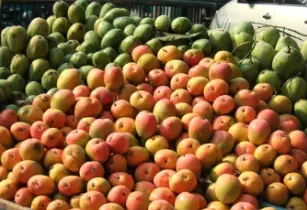A survey conducted in Mango farms in Elgeyo-Marakwet County shows a reduction of flies and increased productivity with the use of pheromone traps
Increases in the quality of mangoes is increasing as Kenyan farming eye up a potentially lucrative European Union market. This is according to report featured in Daily Nation and circulated by Competitive Intelligence Bulletin.
The European Union in 2014 said that it would invest ksh1.4bn (US$16.1mn) into food security in Kenya through apiculture, aquaculture, dairy and horticulture sectors. In addition to these investments, the EU said that it would assist with Kenya's path to developing its farming to meet international trading standards.
Ester Kimani is managing direction of Kenya Plant Inspectorate Health Service, better know locally as Kephis. They were the agency who were bought in to introduce self-regulatory measures to ensure the quality of productions in order to access overseas trade markets.
Kimani said “The International Standards for Phytosanitary Measures (ISPM) no. 26 allows for the creation of pest-free areas to control the fruit flies in some region. We have managed to reduce the pests by 80 per cent and we hope that soon those mangoes will access the European market."
Kephis conducted a survey in mango farms showing a drastic reduction in the number of flies after 6,000 pheromone traps in Elgeyo-Marakwet Country, showing the improvement in the quality of farms produce.
A mango farmer in the area, Mr Kiplaget, said that "The number of fruits that were attacked by these flies resulted to rotting of the produce. We used to harvest 12-15 fruits per tree but this is no longer the case as we are now harvesting 400-500 fruits in a single season."
Kephis are hopeful that pests will no longer be a burden to producers as the scheme is set to be rolled out on a wider scale as part of an EU funded, 3 year project.





